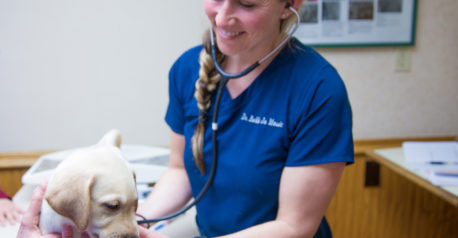Cat Allergies
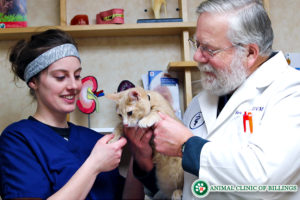 Cats face several types of allergens that can cause a wide variety of problematic symptoms. Allergy testing helps us identify and properly treat the root cause of some issues.
Cats face several types of allergens that can cause a wide variety of problematic symptoms. Allergy testing helps us identify and properly treat the root cause of some issues.
Allergies are by far one of the most common conditions that affect cats. When a cat suffers from an allergic reaction, its immune system overreacts to foreign substances (allergens or antigens). These overreactions manifest in three ways. (1) itching of the skin, (2) localized (one area) and (3) generalized (all over the cat).
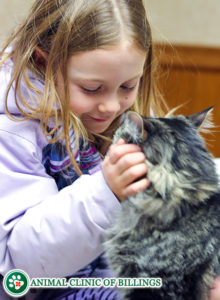 Another over reactionary allergy manifestation for cats involves the respiratory system and may result in your cat sneezing and coughing. This can often be associated with an ocular (eye) or nasal discharge. Additionally, another allergy manifestation in cats can involve the digestive system and cause the cat to have diarrhea or vomiting.
Another over reactionary allergy manifestation for cats involves the respiratory system and may result in your cat sneezing and coughing. This can often be associated with an ocular (eye) or nasal discharge. Additionally, another allergy manifestation in cats can involve the digestive system and cause the cat to have diarrhea or vomiting.
TYPES OF ALLERGIES IN CATS
There are four main types of cat allergies. These include:
- Inhalant allergies
- Flea allergies
- Food allergies
- Contact allergies
INHALANT ALLERGIES IN CATS
 The most common type of cat allergy by far is the inhalant type or atopy type of allergy. Cats can be just as allergic to the same exact inhalant allergens that humans are commonly affected by. These include grass, weed, and tree pollens, mildew, molds, and dust mites. The majority of these allergens occur seasonally, however, other allergens are around us year-round, like molds, dust mites, and mildews. Cat’s react to inhalant allergies by aggressively itching themselves.
The most common type of cat allergy by far is the inhalant type or atopy type of allergy. Cats can be just as allergic to the same exact inhalant allergens that humans are commonly affected by. These include grass, weed, and tree pollens, mildew, molds, and dust mites. The majority of these allergens occur seasonally, however, other allergens are around us year-round, like molds, dust mites, and mildews. Cat’s react to inhalant allergies by aggressively itching themselves.
Most cats suffering from an inhalant allergy are allergic to several varying allergens. When allergen levels are relatively low, itching could last a few steady weeks once or twice a year. If allergen levels are high or present year-round, however, the cat may itch incessantly without a break from the severe agitation.
 Treatment for inhalant allergies in cats typically involves several different approaches. First, steroids are prescribed to block the allergic reaction. These are given either orally or through an injection. Many cats can be considerably helped through bathing initiatives using a hypoallergenic shampoo. In addition to removing the problem, causing surface antigen on your cat, bathing can provide much-needed relief from the itching and can even necessitate lower doses of the steroids.
Treatment for inhalant allergies in cats typically involves several different approaches. First, steroids are prescribed to block the allergic reaction. These are given either orally or through an injection. Many cats can be considerably helped through bathing initiatives using a hypoallergenic shampoo. In addition to removing the problem, causing surface antigen on your cat, bathing can provide much-needed relief from the itching and can even necessitate lower doses of the steroids.
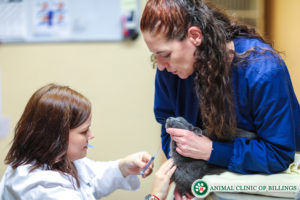 Desensitization is the second form of treating allergies in cats. This is done by giving the cat a series of allergy shots or specific injections. Once the specific types of allergens affecting your cat are identified, tiny amounts of those antigens are injected weekly. This procedure is an attempt to reprogram your cat’s immune system. The best case scenario is that your cat’s immune system becomes less reactive to the problem-causing allergens over time.
Desensitization is the second form of treating allergies in cats. This is done by giving the cat a series of allergy shots or specific injections. Once the specific types of allergens affecting your cat are identified, tiny amounts of those antigens are injected weekly. This procedure is an attempt to reprogram your cat’s immune system. The best case scenario is that your cat’s immune system becomes less reactive to the problem-causing allergens over time.
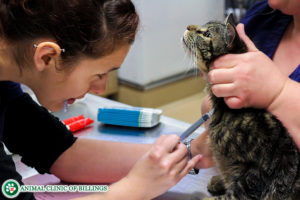 If desensitization does, in fact, appear to help your cat, your veterinarian will recommend continuing those injections for the next few years. Most cats are able to have the itching significantly reduced with this method. Desensitization is the most ideal way to treat an inhalant allergy in a cat, however, there are several drawbacks to desensitization that may not make it the most effective means of treatment in some circumstances. Ask your veterinarian what’s best for your cats individualized needs.
If desensitization does, in fact, appear to help your cat, your veterinarian will recommend continuing those injections for the next few years. Most cats are able to have the itching significantly reduced with this method. Desensitization is the most ideal way to treat an inhalant allergy in a cat, however, there are several drawbacks to desensitization that may not make it the most effective means of treatment in some circumstances. Ask your veterinarian what’s best for your cats individualized needs.
FLEA ALLERGIES IN CATS
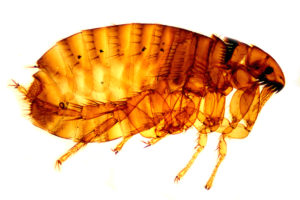 Flea allergies are common in cats. A typical cat experiences only minor irritation in response to flea bites, often without any itching. Cats allergic to fleas have a severe, itch-producing reaction when the flea’s saliva is deposited in the skin. One bite causes brutal itching and may cause the cat to severely scratch or chew itself.
Flea allergies are common in cats. A typical cat experiences only minor irritation in response to flea bites, often without any itching. Cats allergic to fleas have a severe, itch-producing reaction when the flea’s saliva is deposited in the skin. One bite causes brutal itching and may cause the cat to severely scratch or chew itself.
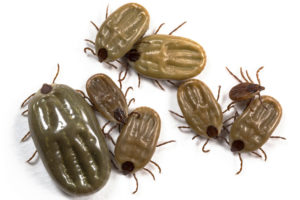 Often, there are open sores and/or scabs on the cats skin, which can allow secondary bacterial infections to take place. The infected cat may have numerous, small scabs around the rump as well as the head and neck area.
Often, there are open sores and/or scabs on the cats skin, which can allow secondary bacterial infections to take place. The infected cat may have numerous, small scabs around the rump as well as the head and neck area.
The most important thing to do if your cat is experiencing a flea allergy is to get your cat away from the fleas ASAP. Strict flea control is the mainstay of successfully treating the allergy.
FOOD ALLERGIES IN CATS
 Cats usually are not born with allergies to food. Usually, food allergies in cats develop after they’ve been eating the food for significant amount of time. These allergies typically develop due to the protein component found in certain cat foods. These can include pork, beef, chicken, or turkey. Food allergies may cause itching, digestive disorders, and respiratory distress.
Cats usually are not born with allergies to food. Usually, food allergies in cats develop after they’ve been eating the food for significant amount of time. These allergies typically develop due to the protein component found in certain cat foods. These can include pork, beef, chicken, or turkey. Food allergies may cause itching, digestive disorders, and respiratory distress.
Our veterinarians at the Animal Clinic of Billings recommend testing your cat for food allergies if any signs of allergy have become noticeable in your cat for several ongoing months. Our veterinarians can help determine the best cat food to alleviate any allergic reactions your cat is experiencing by implementing a special hypoallergenic diet.
It takes at a minimum of eight weeks for all other food products to get out of the system, and during that time, the cat must eat a special diet exclusively for eight to 12 weeks or more. We cannot overemphasize this.
CONTACT ALLERGIES IN CATS
 Contact allergies in cats are the least common type of cat allergies among the four types we’ve listed. Contact allergies result in a local reaction to the cat’s skin. Reactions to flea collars, fabric, or bedding are examples of a cat contact allergy. When cats are allergic to substances such as these, skin irritation and itching are the most common reactionary signs. This is usually easily solvable and requires nothing more than removing the contact irritant, however, identifying just what that is may require some detective work on your part.
Contact allergies in cats are the least common type of cat allergies among the four types we’ve listed. Contact allergies result in a local reaction to the cat’s skin. Reactions to flea collars, fabric, or bedding are examples of a cat contact allergy. When cats are allergic to substances such as these, skin irritation and itching are the most common reactionary signs. This is usually easily solvable and requires nothing more than removing the contact irritant, however, identifying just what that is may require some detective work on your part.
SCHEDULE AN APPOINTMENT AT THE ANIMAL CLINIC OF BILLINGS TODAY!
While caring for a new kitten or cat can certainly be one of the most fun and rewarding experiences you can have as a pet owner, if you are under-informed about the needs of your feline friend, you can leave them at a developmental or debilitating disadvantage.
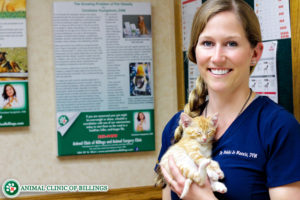 At the Animal Clinic of Billings and Animal Surgery Clinic, cat care and kitten care is one of our greatest joys. Our veterinary staff would be delighted to spend some time with you and your feline companion ensuring that your relationship will be a healthy, happy and rewarding one for many years to come.
At the Animal Clinic of Billings and Animal Surgery Clinic, cat care and kitten care is one of our greatest joys. Our veterinary staff would be delighted to spend some time with you and your feline companion ensuring that your relationship will be a healthy, happy and rewarding one for many years to come.
Please call to schedule a cat care or kitten care appointment with us today!
406-252-9499
ANIMAL CLINIC OF BILLINGS AND ANIMAL SURGERY CLINIC
providing our region’s companion animals and their families what they need and deserve since 1981
1414 10th St. West, Billings MT 59102
406-252-9499



